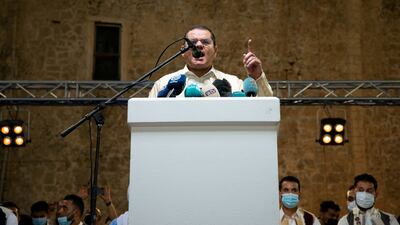Libyan Prime Minister Abdul Hamid Dbeibah promised a new election law on Friday, which he says will bring stability to a politically divided country.
It comes a day after the Libyan Parliament chose a new prime minister, setting up a political showdown with the incumbent, who is refusing to step down.
Mr Dbeibah survived an alleged assassination attempt on Thursday, which left his car riddled with bullets, sources told Reuters.
A day later, he promised a new election law, telling Libya's Al Ahrar TV a bill would be presented to the House of Representatives then transferred to the presidential council for ratifying.
Libya's presidential and parliamentary elections had been expected to take place in December, with nearly three million Libyans signed up to vote, but arguments between rival factions saw the process collapse with days to go.
Mr Dbeibah told Al Ahrar TV two mercenaries were hired to kill him, but he did not elaborate on who was behind the alleged attack. Reuters has been unable to independently verify the details or speak to witnesses.
Libya's parliament spokesperson declared Fathi Bashagha as the new interim prime minister on Thursday, a move Mr Dbeibah rejected.

"The Parliament's selection of a new government is another attempt to enter Tripoli by force,", Mr Dbeibah said.
He compared parliament's move to an incident in 2019 when the Libyan National Army of eastern commander Khalifa Haftar attacked Tripoli.
In a statement on Libya's political turbulence, the UN on Friday said "stability" was the "top priority".
Libyan politicians and institutions should ensure "critical decisions are taken in a transparent and consensual manner", a statement from the office of UN Secretary General Antonio Guterres said.
They should hold "national elections as soon possible in order to ensure that the political will of the 2.8 million Libyan citizens who registered to vote are respected".
Libya has enjoyed little peace since the 2011 Nato-backed uprising against Muammar Qaddafi, and it split after a 2014 election between warring eastern and western factions, a conflict the elections were meant to help resolve.
Agencies contributed to this report.

